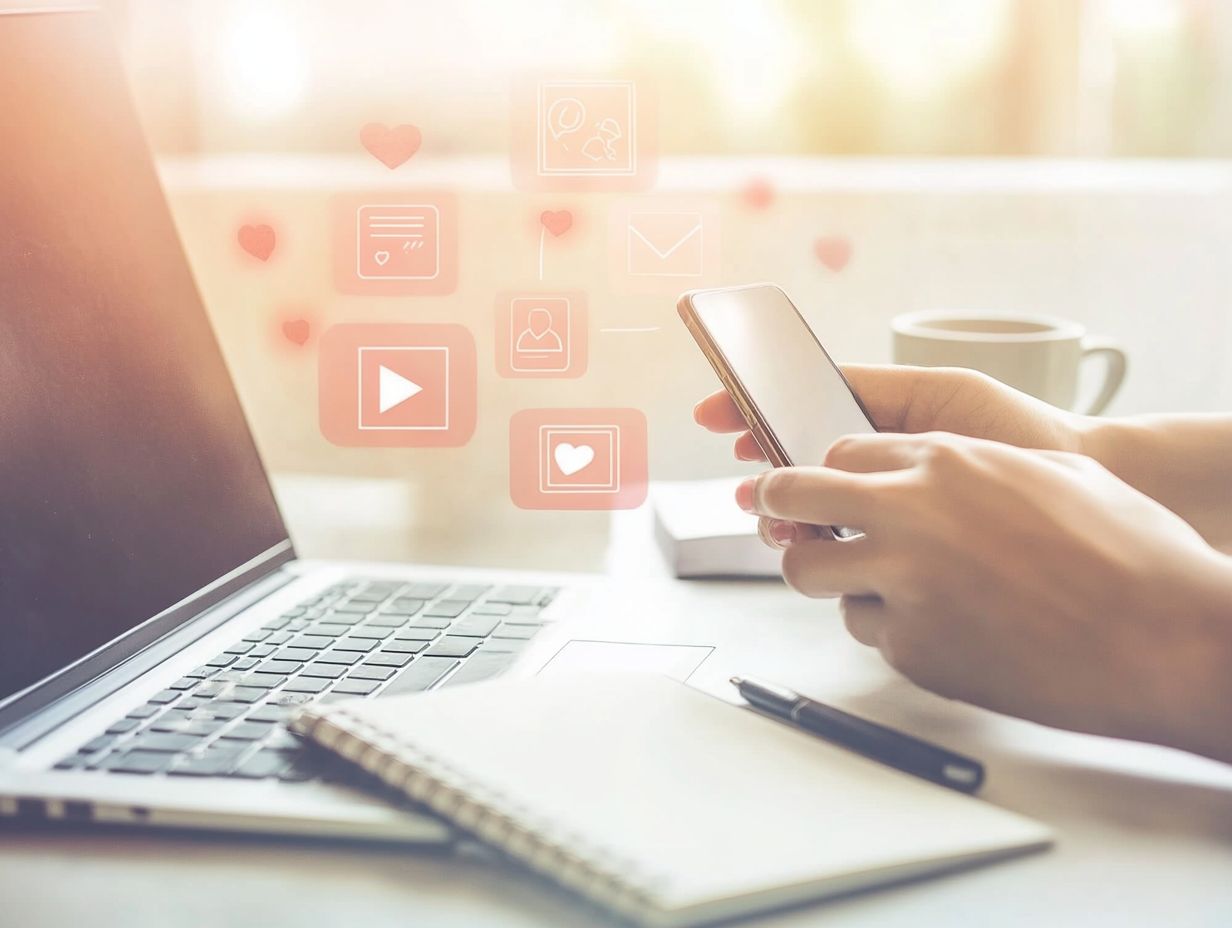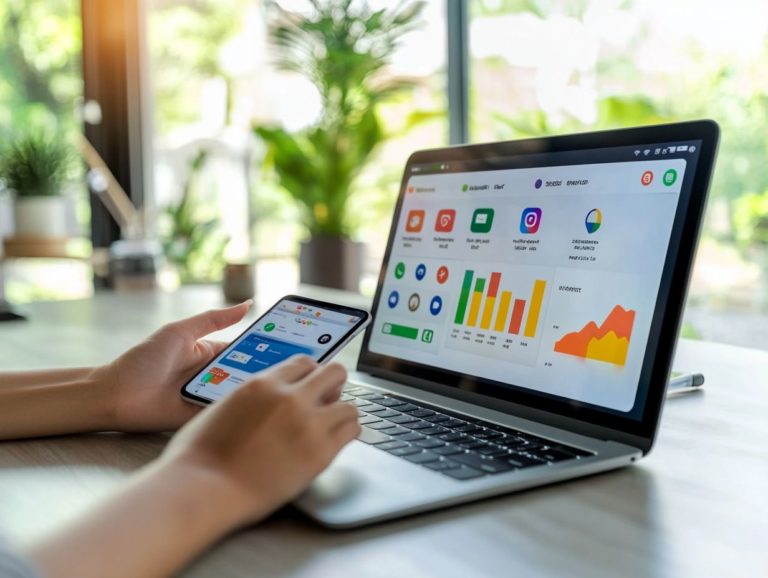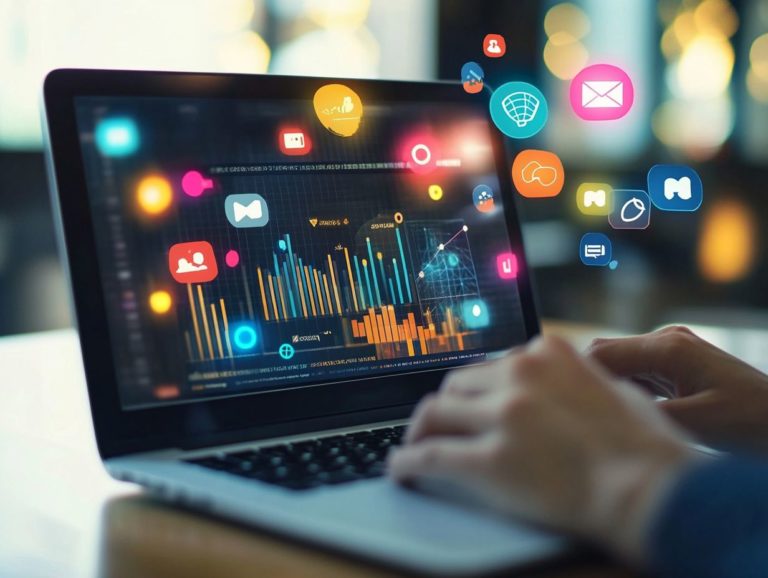How to Use Social Media for Event Promotion
Let's Set Up Your Lead Generation Strategy
Fill out the form below, and our team will get in touch with you to create a tailored solution for your business.
In today s digital landscape, social media has transformed into an indispensable tool for elevating your event promotion. It offers a dynamic platform to connect with and engage your audience like never before.
This article delves into crafting an effective social media strategy tailored to your event s unique objectives and target demographic. You ll learn to identify the right platforms, use features such as live streaming and hashtags, and engage your attendees while measuring success along the way.
Let s explore each step together, empowering you to enhance your event promotion and ensure it truly resonates with your audience.
Prepare to maximize the impact of your event!
Contents
- Key Takeaways:
- Creating a Social Media Strategy for Events
- Let's Set Up Your Lead Generation Strategy
- Utilizing Social Media Features for Event Promotion
- Let's Set Up Your Lead Generation Strategy
- Engaging with Attendees on Social Media
- Measuring Success and Improving
- Let's Set Up Your Lead Generation Strategy
- Frequently Asked Questions
- Let's Set Up Your Lead Generation Strategy
Key Takeaways:

- Identify your target audience and set clear goals before creating a social media strategy for event promotion.
- Use features like live streaming, event pages, hashtags, and influencer marketing to engage with potential attendees and generate buzz for your event.
- Engage with attendees on social media by encouraging user-generated content and responding to feedback and inquiries. Use measurement tools to track success and make adjustments for future events.
Why Social Media is Important for Event Promotion
Social media is essential for event planners. It helps promote your virtual events effectively, reaching a broader audience and driving ticket sales through tailored marketing campaigns.
Platforms like Instagram, Facebook, Twitter, and LinkedIn serve as your canvas for sharing event highlights, behind-the-scenes content, and interactive features that pique audience interest.
By using social listening and collaboration opportunities, you can cultivate customer relationships and achieve your marketing objectives in today s digital landscape.
The true power of social media lies in its ability to target specific demographics. This ensures your marketing efforts are not only widespread but also precisely aimed. With targeted ads, you can connect with those most likely to engage with your events, maximizing your return on investment.
Employing strategic engagement tactics such as live Q&A sessions, polls, and countdowns ignites conversations and makes potential attendees feel involved long before they hit that register button.
By consistently updating your presence across various social platforms, you create buzz and keep your audience informed, ultimately enhancing event registration and boosting participation rates.
Creating a Social Media Strategy for Events
Crafting a robust social media strategy for your events is essential for effective promotion, meaningful audience engagement, and reaching your marketing goals.
This strategy should be meticulously tailored to fit your event planning needs, aligning seamlessly with your marketing objectives while considering the specific audience demographic you aim to attract.
Identifying Target Audience and Goals
Identifying your target audience and setting clear goals are essential steps in crafting an effective social media strategy for your event. By understanding your audience’s demographics, you can tailor your marketing tactics to resonate with them, ensuring higher engagement levels and nurturing stronger customer relationships.
To conduct thorough audience research, leverage tools like surveys, social media insights, and website analytics to gather valuable data on potential attendees. This approach sheds light on demographic preferences and reveals emotional triggers that inform your personalized marketing strategies.
Let's Set Up Your Lead Generation Strategy
Fill out the form below, and our team will get in touch with you to create a tailored solution for your business.
When establishing marketing objectives, aligning these goals with your event’s unique features is crucial. This alignment ensures your messaging and outreach strategies emphasize what makes your event stand out.
By concentrating on engagement metrics such as shares and comments, you can continuously refine your tactics, creating a more impactful and personalized experience for your audience.
Choosing the Right Platforms
Choosing the right social media platforms is crucial for maximizing your event’s reach and engagement. Each platform Instagram, Facebook, Twitter, and LinkedIn has unique advantages.
Understand where your target audience spends their time for effective targeting. For instance, Instagram dazzles with visually compelling video content and Stories feature.
This makes it perfect for showcasing event highlights. Facebook offers diverse features like polls and event pages to facilitate comprehensive interaction.
This streamlines communication and helps with efficient RSVP management. Twitter’s real-time nature is ideal for live updates.
LinkedIn caters to professional audiences, making it great for networking events. By harnessing each platform’s strengths, you can craft a multifaceted promotional strategy.
Utilizing Social Media Features for Event Promotion

Using the features of social media can elevate your event promotion strategy. Embrace tools like livestreaming and dedicated event pages.
This fosters deeper audience engagement and encourages user-generated content. It can significantly boost brand awareness and enhance event participation.
Live Streaming and Event Pages
Livestreaming events and dedicated event pages are powerful strategies. They significantly enhance audience participation and engagement.
These features provide real-time access to activities and create an engagement funnel to drive registration and ticket sales.
To maximize your impact, integrate interactive elements like polls and feedback opportunities. This attracts attendees and makes them feel appreciated and involved.
For remote audiences, share event highlights via social media and email. This stirs excitement and anticipation.
Craft visually appealing event pages with clear information. This increases the likelihood that viewers will register and participate.
Let's Set Up Your Lead Generation Strategy
Fill out the form below, and our team will get in touch with you to create a tailored solution for your business.
Event hashtags and influencer marketing can elevate your event s visibility. Create creative contests and promotions around these hashtags to encourage social sharing.
Effective event hashtags should be short, memorable, and aligned with your event’s theme. This helps attendees easily recall and use them.
Collaborate with influencers who resonate with your audience. Their authentic reach can attract followers who may not have engaged otherwise.
Host contests that invite users to share photos or stories related to the event. This can significantly boost engagement and deepen community interactions.
Engaging with Attendees on Social Media
Engagement with attendees on social media is essential for elevating your event marketing strategy. Foster meaningful interactions and encourage user-generated content to keep the excitement alive.
This approach enhances participation and cultivates a vibrant community around your event.
Encouraging User-generated Content
Encouraging user-generated content is a powerful strategy to elevate audience engagement and create a community around your event. By implementing contests and various engagement techniques, you can motivate attendees to share their experiences online, significantly amplifying your event’s reach.
Utilizing unique hashtags and offering rewards for standout posts can further inspire participants to dive in. This type of content generates excitement and enriches your brand narrative, providing authentic glimpses into the event experience.
The advantages of user-generated content extend well beyond immediate engagement; they significantly increase brand awareness and trust. When attendees share their moments, they re not merely promoting an event; they re broadcasting your brand s message to their networks.
Monitoring engagement metrics such as likes, shares, and comments offers invaluable insights into what truly resonates with your audience. This makes social sharing a critical part of your marketing strategy.
Responding to Feedback and Inquiries

Responding to feedback and inquiries promptly on social media shows that you truly value attendee input, fostering stronger customer relationships. This engagement approach enhances audience involvement and allows you to refine your event marketing strategies.
Taking the time to address questions or concerns reveals your commitment to exceptional service, which can significantly boost brand loyalty. Managing interactions well makes attendees feel welcome and encourages community growth around your events.
When attendees feel heard, they re more likely to share positive experiences, attracting new participants and strengthening existing relationships. By prioritizing timely communication, you not only manage expectations but also cultivate a sense of belonging that resonates well beyond the event itself.
Measuring Success and Improving
Measuring success and making improvements are crucial steps in elevating your future event marketing strategies. By utilizing measurements that show how well your event is doing, you can analyze your performance against your marketing goals, ensuring that your audience targeting efforts align seamlessly with your desired outcomes.
Let's Set Up Your Lead Generation Strategy
Fill out the form below, and our team will get in touch with you to create a tailored solution for your business.
Metrics to Track and Analyze
Tracking the right event metrics is essential for understanding audience engagement and evaluating your ticket sales performance. Metrics like social media analytics and participation rates offer invaluable insights into how effective your promotional campaigns truly are.
By closely monitoring these specific indicators, you can assess the success of your marketing objectives in real time. Utilizing methods such as surveys and behavioral tracking provides you with in-depth data on attendee preferences and pain points. This information is crucial for refining your audience targeting and tailoring future events to align more closely with participant interests.
Translating these metrics into actionable strategies like adjusting your promotional tactics or enhancing the attendee experience based on feedback can significantly boost the performance of your subsequent events, ensuring sustained engagement through event highlights and increased ticket sales.
Adjusting Strategy for Future Events
Adjusting your strategy for future events based on previous outcomes is crucial for continuous improvement in event planning and audience engagement. By analyzing past performance against your marketing objectives, you can pinpoint areas for enhancement and refine your approach.
Utilizing insights gained from comprehensive metrics reveals what worked and uncovers potential pitfalls. As an event planner, embracing social listening techniques is essential. Gathering valuable feedback from attendees allows you to fine-tune your strategies, demonstrating that their opinions truly matter.
This practice nurtures stronger customer relationships, leading to increased loyalty and engagement. By continuously monitoring trends and audience preferences, you can implement best practices that resonate with your target demographic, ensuring your future events are not only well-received but also genuinely impactful.
Frequently Asked Questions
This section addresses common questions that attendees often have regarding events.

Use social media to create a strong online presence. Make event pages, use hashtags, and share engaging content.
Use multiple platforms like Facebook, Twitter, Instagram, and LinkedIn. This helps you reach a broader audience.
3. How can I create buzz around my event?
Post teasers and sneak peeks. Run contests and share creative graphics to grab attention.
4. Should I invest in paid advertising?
Investing in paid ads helps you reach a larger, targeted audience. This increases your chances of attracting attendees.
5. How often should I post about my event?
Post about your event at least once a day leading up to the date. Increase frequency as the event approaches, but avoid overwhelming your followers.
Track metrics like engagement rates, which measure likes and shares, website clicks, and ticket sales. Ask attendees how they heard about the event to gauge which platforms worked best.
Let's Set Up Your Lead Generation Strategy
Fill out the form below, and our team will get in touch with you to create a tailored solution for your business.






